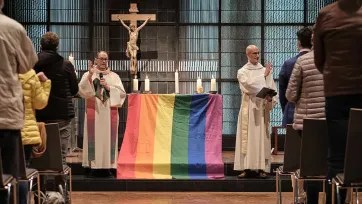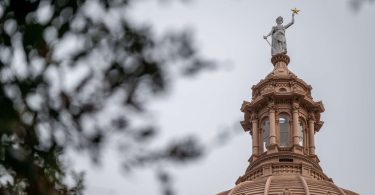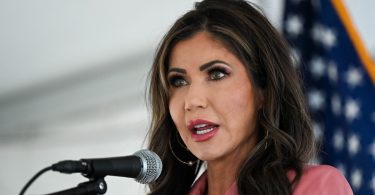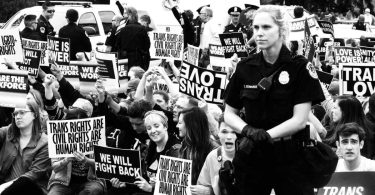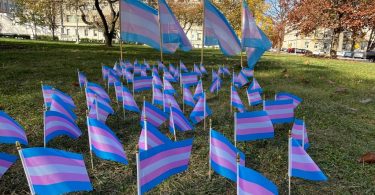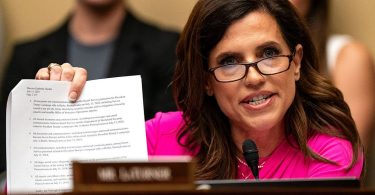By now, it is fair to say the release of Fiducia supplicans, the Vatican’s document allowing blessings for same-gender couples, and reactions to it is the biggest Catholic LGBTQ+ news story of Pope Francis’ tenure, if not a longer period. At Bondings 2.0, we have tried to keep our readers updated—but the news is developing so quickly, we have not been able to report on everything. Today’s post is a round up of reactions from LGBTQ+ advocates that have not yet been covered. For previous coverage of reactions, click here.
United States: Juan Carlos Cruz, a friend of Pope Francis and New Ways Ministry board member, expained that Fiducia supplicans is the pope’s attempt to correct the harmful Vatican ban on blessings in 2021. Cruz commented to The New York Times, “[Francis] acknowledged that the buck stops with him. I got the impression that he wanted to fix it.”
Jamie Manson, president of Catholics for Choice who is lesbian, was quite positive about the blessings declaration. She told the San Francisco Chronicle:
“‘LGBTQ people will not have justice in our church until we have access to all the sacraments of the church — in this case, the sacrament of marriage. But this is a first step into bringing the notion of God’s presence and blessing into same-sex relationships. . .Honestly, it sort of took my breath away. This is real change, not just something Francis is saying. . .As someone who has been advocating for LGBTQ people, as someone who is a lesbian, it’s very affirming to see.’”
However, Manson also told The Associated Press, “Given the homophobic and transphobic climate created by many bishops in the United States, the average same-sex couple likely still won’t feel comfortable presenting themselves to their local bishop or priest to ask for a blessing.”
Craig Ford, a gay theologian at St. Norbert College, argued the problem with Fiducia supplicans is not a confusing document, but priests’ discernment. He told Religion News Service:
“‘From my vantage point, it’s a pretty straightforward document. . .It’s really not that hard to figure out what the Vatican is saying. . .The people who are going to struggle with how to do this are going to be priests who are living or serving in communities where they know that they have same-sex couples. They know, from the Vatican, that they should, but it’s not clear that they will.’”
Sr. Jeannine Gramick, the co-founder of New Ways Ministry who has blessed same-gender couples, told USA Today, “This is the hope that so many Catholic lesbian and gay couples that I know have had. And now their hope is materialized.”
Peggy Ehling, co-chair of the Archdiocese of Los Angeles’ Ministry With Lesbian and Gay Persons, told the Los Angeles Times that the declaration “greets LGBTQ Catholics with an acknowledgment rather than a condemnation, and that is a change.” Ehling added, “it gives priests and other ministers in the church a little flexibility to be more pastoral, to meet people where they are and to acknowledge that they have a relationship with God.” (Archbishop José Gomez has not issued a response.)
Flora X. Tang, a queer theologian, said the declaration is, in part, just acknowledging an existing reality about blessings in the church. She commented to Religion News Service:
“‘I think there’s definitely a lot of barriers for queer Catholic couples in terms of whether they feel comfortable approaching a priest for a blessing, knowing how much homophobia there is in Catholic spaces. . .In Catholic spaces, we receive blessings every Sunday at Mass. Queer Catholics and priests have been blessing each other through ministry, through presence, through accompaniment for a very long time.’”
The New York Times reported on a blessing that Jesuit Fr. James Martin bestowed on theologian Jason Steidl Jack and his husband, Damian Steidl Jack. Martin commented on the moment, “It was really nice to be able to do that publicly.” The Times report quoted another New York City priest, Fr. Joseph Juracek, pastor of the Church of St. Francis of Assisi, who said simply: “I say it is about darn time. . .This is what he is all about: That God is for all people.”
In the U.S., Becoming a Welcoming Community, an LGBTQ+ ministry sponsored by the sisters of St. Joseph of Lyon in Maine, said the group was “encouraged by anything that will help bring” the Catholic Church and LGBTQ+ people “closer together.” Ryan Fecteau, a gay Catholic and former Speaker of the Maine House of Representative, commented to the Portland Herald Press:
“’It captures the challenge the church faces in having some members who don’t think the church should evolve and some who do. . .It’s a constant struggle for me to reconcile my feelings about a church that’s entwined with my family history and spiritually where I feel most at home but also most conflicted. . .It moves the needle to some extent, but the lesser status of same-sex couples persists.’”
Call to Action, a church reform group, issued a statement saying it “celebrates this significant victory for LGBTQIA+ Catholics and others who remain on the margins due to their relationship status.” The statement added, however:
“We call on the Vatican to further validate same-gender relationships by revising the language of ‘scandal’ when referring to same-gender unions and non-heteronormative relationships. We also urge the Vatican to reconsider its doctrine on the sacrament of marriage and allow LGBTQIA+ and divorced Catholics the opportunity to participate in the sacrament. All LGBTQIA+ Catholics, divorced and remarried Catholics, and single and parenting Catholics are equally blessed.”
Joseph Gentilini, a married gay Catholic, said the blessings declaration was both “a small step and a major step.” He commented to the Columbus Dispatch about the change that has happened and the work that remains:
“‘For many people, this will make a difference in their lives. . .I only wish my mother could have been able to hear this from the pope. It was a very hard struggle for her to accept she had a gay son. … She died 30 years ago. . .My vocation is to be a gay Catholic man, in relationship with Leo and with God — within the institutional church. And if I leave the church, then I lose the witness that I can have, and do have, to the goodness of our lives.’”
The Associated Press reported on priests celebrating the fact they can now bless LGBTQ+ love, such as Fr. Alex Santora, pastor of Our Lady of Grace in New Jersey. Santora called the blessings declaration “a very important step” as people realize “the church is finally recognizing the goodness of their lives.” He already plans to bless one same-gender couple who have been devoted parishioners at his church for decades. Relatedly, in Germany, Fr. Wolfgang Rothe, who led efforts to bless same-gender couples after the Vatican initially banned such blessings in 2021, commented:
“In my church, such blessings always take place when anyone has the need. . .In many countries around the world there are opposing moves to maintain homophobia in the church. For homosexual couples living there, the document will be a huge relief.”
Gary Stavella, a leader with Fr. Santora at Our Lady of Grace’s LGBTQ+ ministry, echoed this sentiment, telling AP of nations where homosexuality is criminalized, “There are a lot of anti-LGBTQ cardinals in those countries, and in ours. For their boss to say, ’You can’t condemn them, you should bless them’ is a sea change. It can save lives.”
Leaders of DignityUSA have continued to speak about Fiducia supplicans. Meli Barber, the group’s president, told USA Today: “My ultimate dream is to one day have our marriage validated in the Catholic Church, but along the way, we definitely do plan to have a blessing.” Barber added of her wife, Carli Stevenson, “My relationship makes me a better person. My wife is helping me get to heaven.” Marianne Duddy-Burke, DignityUSA’s executive director, wrote in The Boston Globe, in part:
“The 2021 statement evoked an enormous global outcry, from LGBTQ Catholics, their families, and from front-line ministers around the world. The denial of blessings and what was seen as an unnecessarily cruel condemnation of same-sex relationships made many feel a deep exclusion and pain. This backlash was clearly heard at the Vatican. . .The fact that pastoral concerns of LGBTQ Catholics, our families, and supporters were heard, taken seriously, and responded to in a way that validated our concerns is vindication of the work done by so many advocates and Catholics who over the decades risked coming out.”
Several DignityUSA chapters generally lauded the declaration, including Dignity Chicago, Dignity Philadelphia, Dignity New York, Dignity San Francisco, and Dignity Twin Cities. Frank Testin of Dignity Canada Dignité was less positive, telling CTV News, “It says some judgmental, stern and not very loving comments towards its LGBTQ2S+ members – church members who are or want to be in relationships.”
Germany: Fr. Wolfgang Rothe, who led efforts to bless same-gender couples after the Vatican initially banned such blessings in 2021, commented:
“In my church, such blessings always take place when anyone has the need. . .In many countries around the world there are opposing moves to maintain homophobia in the church. For homosexual couples living there, the document will be a huge relief.”
Kenya: Njeri, who is LGBTQ+, said the declaration is “a crack in the wall” allowing people to “be more open to listening now, to also understanding that our life is also just like anyone else’s.” Njeri continued to DW:
“‘Honestly, it feels like a step in the right direction, even if it is a small one. The pope acknowledging our relationship, even just saying that they can be blessed, carries weight here in Kenya. . .
“‘It is not everything we want. Recognition is great but full marriage, equality, legal protection and societal acceptance are still hurdles we face every day. . .This feels like small victory, but one that gives me hope for a future where we can be open and loved just for being who we are.’”
Namibia: The director of OutRight, Agapitus Hausiku, told The Namibian, “We welcome this change of mind and move, and hope politicians stuck up in old colonial dogmas would wake up and move with the changing times. This is a call for celebration for open-minded and progressive societies.”
Spain: Raul Pena of Crismhom, a Catholic LGBTQ+ group in Madrid, told The Associated Press the blessings declaration could do much good, saying, “If the priest from your town talks about gays being the devil in his sermons each Sunday, which some priests do, now you have the pope signing a document saying that homosexuals who live as a couple can be blessed. . .It’s a fundamental step for those hierarchies and for those people who are in places where being LGBT is difficult.”
Other Countries: LGBTQ+ advocates also praised Fiducia supplicans and Pope Francis in the Philippines, Italy, South Africa, Malawi, Brazil, and elsewhere in Latin America.
Bondings 2.0 will continue to provide updates about the reception of Fiducia supplicans and further developments in the coming days. If you do not already subscribe to receive daily posts on the latest Catholic LGBTQ+ news, opinion, and spirituality delivered to your inbox, you can do so by clicking here.
—Robert Shine (he/him), New Ways Ministry, January 6, 2024
Related Articles
Baptist News Global, “Hope and the pope: Defending LGBTQ people more than our positions“
CNN, “Pope’s approval of same-sex blessings marks historic shift for gay Catholics”
The Nation, “Why LGBTQ Catholics Are Ambivalent About the ‘Gift’ of Same-Sex Blessings“

